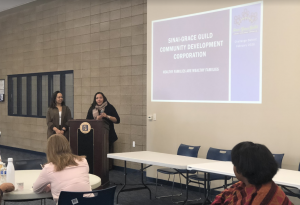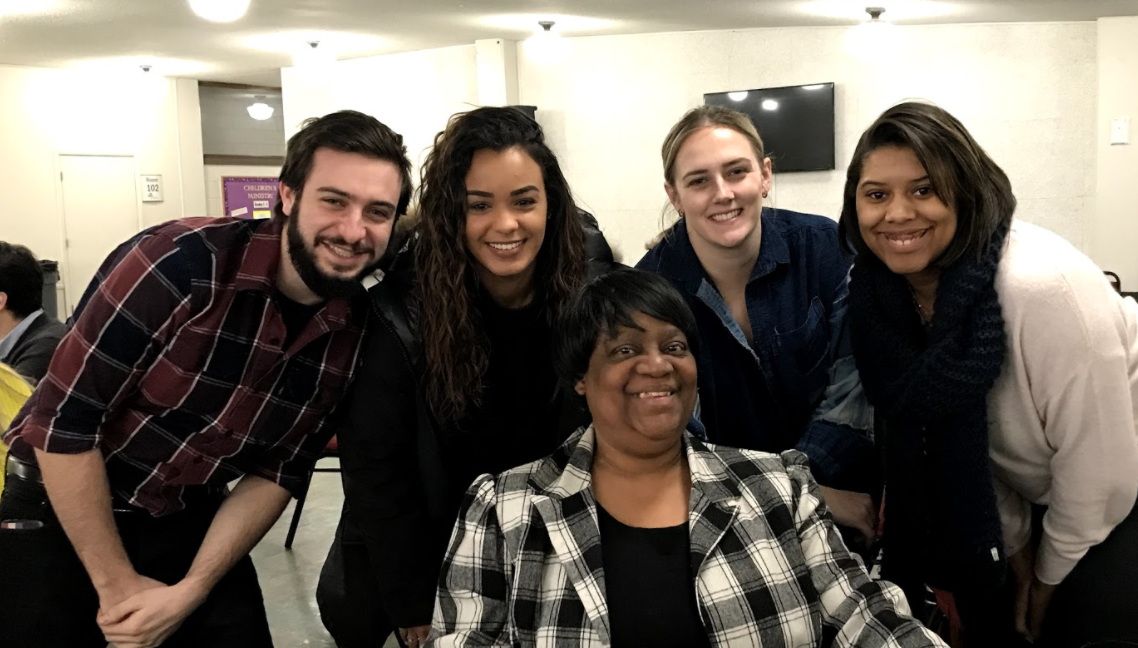Five Insights from Working with Sinai-Grace Guild Community Development Corporation During the COVID-19 Outbreak
It’s another day of isolation. For the past week, we’ve only spoken in-person with the other people living in our households. Daily news, healthcare notices, and economic alerts are now a daily source of anxiety. Businesses, public spaces, and crowded events suddenly feel unsafe. Mass transportation is becoming more difficult to use. As the stock market plummets, retirement savings are looking a little grimmer. Everyone is fearful for their family, friends, neighbors, and pets. Life as we know it is changing rapidly and whether physically or mentally, many of us do not feel prepared.
Members of our community have similar concerns, only to be compounded by a lack of Internet or transportation access, food insecurity, or being “just one bill away” from losing vital utilities like water or electricity. For some, there is a larger concern about losing income, homes, and unthinkably, loved ones.
A new reality has set in. This is COVID-19.
On the other hand, pandemic aside, Challenge Detroit Fellows have also recently learned that the current global situation has frightening parallels to how aging and older adults in Detroit may feel every day: isolated, lonely, in need of assistance, and that there is nowhere left to turn.
That’s why Challenge Detroit spent the past six weeks collaborating with Sinai-Grace Guild CDC and the older adults in its service territory, seeking to answer the following overarching question, “How might we support a thriving age-friendly community in Northwest Detroit?”
While our needs assessments and strategic recommendations spanned solutions from technology and mental health to housing, transportation, and more, here are five insights we learned:
1. We’re stronger when we work together, connect, and draw from our entire network.
In times of uncertainty, we look for structure and clear access points to helping hands. Often, the supports we need hide behind mountains of paperwork and red tape. Through our interviews, we learned that many older adults live in uncertainty and feel overwhelmed and lost when it comes to finding and using available assistance.
One community leader told us, “If you bring in resources, they’re only valuable if they’re being used.” No matter how many supportive organizations and programs there are, their presence means nothing if they’re not accessible to those they’re meant to serve. The creation of clear access points for older adults to engage with and benefit from existing structures and resources will ideally pull together communities so everyone’s needs can be met.
The hope is that in hard times, through recognizing and using available support networks, neighbors can become neighbors again.
2. Mobility is defined by the ability to move and get around; it is not specific to vehicle transportation.
Fortunately for the older adults we interviewed, these individuals either owned a car and were able to drive or had many friends who could take them wherever they needed to go. However, as we learned from our partners, these seniors are the lucky ones.
Many elderly folks in the community do not have a driver’s license and feel it is unsafe to walk around their neighborhood. Others may not be aware of curbside transit opportunities or they don’t have many friends to call for a ride to the grocery store. A lack of mobility impairs one’s whole self, including physical health, mental health, and overall well-being.
Through fostering community connections, making resources available at someone’s doorstep, and sharing talents, we hope impaired mobility can be reduced in northwest Detroit going forward. We all have some skill or asset that someone else could use, we just need to remember to share it; especially in these times!
3. We need to be proactive in our connectivity.
As we worked through designing branding and communications for Sinai-Grace Guild CDC, we specifically focused on the disconnected portion of the aging population and how to transform them into active community members. We gained great insight when one of the community members explained that caregivers, family members, and seniors only become engaged in the community and its resources once there’s a crisis. This crisis mentality leads to people making decisions out of fear and lacking knowledge of their options.

Executive Director Lisa Campbell and Program Manager Crystal Head speak to Fellows at our project kickoff on February 14.
As we face an international crisis that’s instilling fear in people, we have gained empathy for our seniors that are already experiencing isolation in their normal lives. This fear makes it harder to settle anxiety and allow for positive steps to be made. We believe that by strengthening the deep social connections in our communities, we can start to rebuild communities and get support to our most vulnerable populations.
4. Technology is more adopt-able when it’s connected to passion, not pressure.
It’s no secret that the modern world is reliant on technology. However, throughout our empathy interviews, we found that some older adults were resistant to embracing technology, as technology is often introduced and socialized through stressful systems that they already may mistrust (i.e. bills, medical records, online banking, etc.).
By connecting technology education and digital literacy to the interests and hobbies of older adults, we can more easily break down the barriers that inhibit them from utilizing secure, efficient, and helpful technological advances. The connectivity that this fosters also allows older adults to be at the center of more personalized learning that creates a “for us, by us” experience and invites discussion around existing expertise, while acquiring new skills. This approach increases engagement and reinforces the perception that older adults are valuable members of our community that can be both the student and the teacher.
5. We all have to remember: Age is just a number.
For many older adults, it is apparent that the accomplishment of retirement doesn’t guarantee automatic happiness. Older adults we spoke to reiterated how important it is to have a purpose as we age. Many believed that no matter what goal you’re working toward, there is both internal and external value in doing something – be it volunteering in church, community organizing, teaching youth, etc.
So, in light of COVID-19 or helping an older adult in your community, let’s all remember to have a bias for action. Start helping others as you can, even if it’s small. As one older adult that we interviewed wisely remarked, “Start something and you’ll get somewhere. Start nothing and you’ll get nowhere.”

Our Sinai-Grace Guild CDC project partners, seniors from the Northwest Detroit community, and Challenge Detroit Fellows were able to come together in-person at the start of our project in February, prior to the stay-at-home order due to COVID-19. Fellows and our partners saw the project through to completion in late March, collaborating virtually and working safely from home.
***

